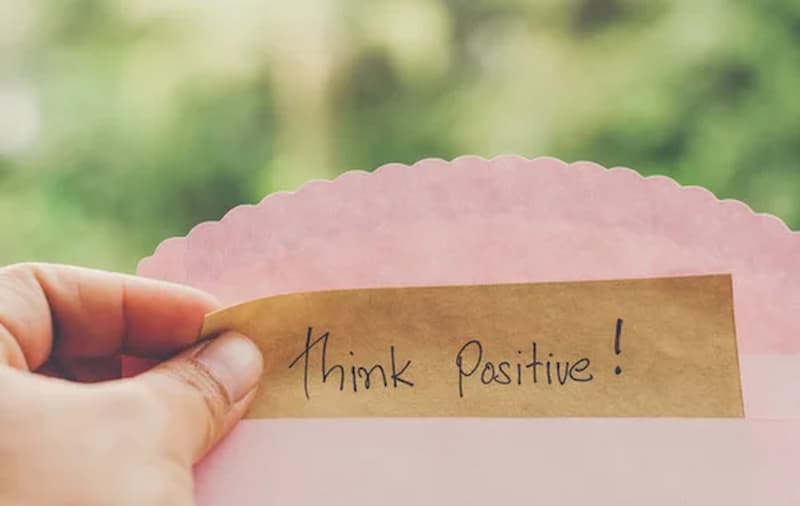(Exploring Your Mind) Toxic positivity is an excessive and ineffective overgeneralization of a happy, optimistic state across all situations. This article will address the dark side of this “positive vibes” trend.
Related Religion and Psychology Share Methods for Reducing Distress
by Staff Writer, July 4th, 2021
Have you ever heard about toxic positivity? It’s an excessive and ineffective overgeneralization of a happy, optimistic. I remember that, when I shared a bad experience with a friend, she cut me off with unhelpful words. She said, “Just be grateful for everything you have. It’ll get better!” I replied that I was grateful for what I had. Even so, I was mourning the loss of something important at that moment.
Yes, “it”, as in my life or situation, would surely get better. What had happened to me wasn’t good, it wouldn’t get better, and it was over. Couldn’t she see that? She couldn’t and continued to bombard me with bright and happy, meme-worthy sayings. For instance, “Look on the bright side, and “It could be worse”. I got frustrated enough that I ended the conversation. At that moment, I wanted to be with my negative emotions.
I didn’t want to be told to get over them, ignore them, or bottle them up. However, my friend had another tactic in mind: toxic positivity. She overdosed me with the sickeningly sweet nectar of her platitudes. “This type of positivity contributes to ‘all or nothing’ thinking. It’s a type of distorted assumption that things have to be either all good or all bad,” said Rizzi. Alice Rizzi is a therapist from New York City and a MyWellbeing community member.
“No one is happy 100 percent of the time, nor should they be. Humans are multi-faceted and experience complex emotional states.” Although looking on the bright side 24 hours a day sounds wonderful, it’s detrimental to your mental health. While hope and positivity are important, there must be a balance, like everything else. Here’s some insight from our community of experts about toxic positivity and its impact on mental health. We’ll also address its dark side.
“I’d rather be whole, than good.”
-Carl Jung-

What’s toxic positivity?
“It’s the mistaken belief that only ‘good’ or ‘happy’ emotions are acceptable to experience. Besides, keeping a positive attitude will solve all or most problems, including mental or physical health issues,” said Shannon Gunnip. She’s a famous New York City therapist and MyWellbeing community member. “Surely, it’s true that positive self-talk can improve mental health and self-esteem. It isn’t healthy or possible to deny all uncomfortable emotions,” she added.
“Not unlike toxic masculinity, toxic positivity deems certain qualities or feelings as ‘good’ or ‘bad,’ ‘acceptable’ or ‘unacceptable.’” It also denies a person the experience of a full range of human emotions. In other words, it discourages the expression of the ‘bad’ or ‘unacceptable’, though the person was just practicing positivity. Maybe you’re sad or mad and they’re just trying to get you to look on the bright side.
They even gave you a pep talk. How bad can that possibly be? “Excessive positivity when you try to honor your true feelings is like informing someone you have a nut allergy. Still, they eat a Reese’s Cup in front of you, telling you to live fearlessly,” said Joanne. Joanne Davies is a MyWellbeing community member who offers coaching and hypnosis. “Positivity, when you’re seeking help, is like showing a doctor your open wound and them sprinkling it with glitter.”
That’s right: it’s painful to have your feelings invalidated and your pain and experience diminished. Not only does excessive positivity invalidate your emotional state but it also increases secondary emotions. You might end up feeling ashamed of being sad or embarrassed about being afraid or angry. “Toxic positivity is toxic!” said Beatty Cohan.
Beatty is a brilliant New York City therapist and MyWellbeing community member. It isn’t healthy for you to avoid acknowledging your negativity. “Not expressing your authentic negative emotions, like fear, disappointment, anger, and betrayal, keeps you in a world of illusion and fantasy. Inevitably, it harms your physical, emotional, and mental well-being.”
How it impacts our mental health
“Toxic positivity discourages and denies a full expression of human emotion by labeling certain feelings as ‘bad’ or ‘unacceptable.’ People who subscribe to this belief may suppress their negative or uncomfortable emotions,” said Shannon. “When unpleasant feelings arise, like grief, sadness or even anger, people shouldn’t judgmentally sit with these emotions. It’s important to allow them to run their course.”
Nevertheless, people who buy into this notion of positivity will end up feeling even more unpleasant feelings,” she added. You may judge yourselves for experiencing the ‘bad’ feeling in the first place. You may even believe that something is wrong with you, that keeping a positive attitude is difficult. This can have a huge impact, compounding your existing negative emotions, and you’ll ignore what’s real for you.
You’ll train yourself to not speak truthfully when you’re hurt, angry, or scared. Toxic positivity highly cheapens the human experience and makes us feel invalid for falling into the ‘wrong’ binary state. It can bring on shame that you’re ‘flawed’. You may also feel ‘broken’ if you don’t happen to think positive thoughts all the time. By the way, this is impossible. You just aren’t hard-wired that way.
“Everything worthwhile in life is won through surmounting the associated negative experience. Any attempt to escape the negative, to avoid it or quash it or silence it, only backfires. The avoidance of suffering is a form of suffering. The avoidance of struggle is a struggle. The denial of failure is a failure. Hiding what’s shameful is itself a form of shame.”
-Mark Manson-
Why it’s bad for our health
Excessive positivity can lead to the following negative emotions:
Shame
Forcing a positive outlook on pain is like encouraging a person to keep silent about their struggles. Most of you don’t want to be seen as a drag or “bad”. Therefore, when the choice is between A) being brave and honest or B) pretending like everything is going great, you might be tempted to adopt the latter. Did you know that the energy source of shame is silence, secrecy, and judgment?
In other words, where there’s hiding, secrets, and denial, shame is usually in the driver’s seat. Shame is crippling to the human spirit and one of the most uncomfortable emotions you can feel. Often, you don’t even know that we’re feeling shame.
Suppressed emotions
Several psychological studies show us that hiding or denying feelings leads to more stress on the body. It also leads to increased difficulty avoiding distressing thoughts and feelings. Experts divided research participants into two groups to conduct a study. Then, they were then shown disturbing medical procedure films, while their stress responses were successfully measured.
For example, heart rates, pupil dilation, and sweat production. Guess what? The participants who suppressed their emotions (acted as if nothing bothered them) had significantly more physiological arousal. Although the emotional suppressors may have seemed cool and calm, they were stressed on the inside. This shows that expressing a range of emotions (even the “not-so-positive” ones) help us regulate our stress response.
Other healthy alternatives
Just because we want to feel our negative emotions doesn’t mean we have to dwell on them forever. Even so, there are healthy ways to cope and start to move forward without turning to toxic positivity. “Practicing mindfulness can help you identify and respond to how you’re feeling in a healthy, compassionate way,” said Alice. Acknowledging that something is there and naming what it is further validates your experience.
Can you truly admit that you feel an emotion, whether it’s pleasant or uncomfortable? It’s up to you to decide how to respond to it. For instance, taking a tap when tired or journaling when you’re frustrated. “Alternatively, toxic positivity will have you believe that you ‘shouldn’t’ feel uncomfortable. It will also lead you to believe that something is wrong with you if you do,” she added.
This experience dismisses your very real feelings that may be trying to tell you something important and being human is uncomfortable. It’s much more the ‘default state’ than happiness ever was. Is someone trying to “help” you with toxic positivity? Consider fully explaining your needs to them if you feel capable of doing so. Try saying something like:
- “Right now, I just need to talk about what happened to me. Can I count on you to listen?”
- “Thank you for caring. Firstly, it’d be best for me to sit with my negative emotions. Later on, I’ll try looking on the bright side.”
- “What happened to me really hurt. I’d like to acknowledge my sadness before I try to move on.”
It can be really hard to speak your truth to someone when you’re in pain. Hopefully, the other person realizes what they’re doing, listens to you, and honors your feelings. If not, it’s completely fine to take a break from that person until you’re ready.
Tips to better address your emotions
Do you often find yourself practicing toxic positivity? Check out these tips. When people tell you how they feel, more often than not, they want to have their feelings validated. They also want their problems normalized and to feel listened to. Many of you hesitate to acknowledge when a loved one’s situation is painful or difficult. You do it out of fear that doing so could somehow make things worse for them. Try saying things like:
- “It sucks that that happened to you. Do you want to talk about it?”
- “That sounds awful. I can see why you’re upset. I’m here if you need to vent.”
- “It makes sense that you’re sad. That was a really tough situation.”
Chances are that your loved one already feels that pain and is aware that their circumstances are challenging. Refusal to acknowledge their pain by suggesting they ‘just be grateful things aren’t worse’ is very harmful. Furthermore, telling them to ‘look on the bright side’ doesn’t help. Humans are born with the capacity for a full range of emotions. It’s possible to hold space for the ‘good’ and the ‘bad’ at the same time.
Remember that it’s normal and healthy to feel all of your emotions, both the good and the bad. Toxic positivity is an attempt to quell our negative emotions and feelings. It can have a detrimental impact on our mental health. However, once you feel your emotions, it’s important to figure out what you can to move forward. A highly skilled therapist and doctor can help you with this.
“My mantra is to acknowledge, address, and take steps to RESOLVE feelings getting in the way of our life. These negative emotions also get in the way of relationships,” said Beatty. Acknowledging your negative emotions is the first step toward healing from trauma and hurt. What will you do the next time someone tells you to look on the bright side? Remind them that acknowledging the dark side is the first step forward.

The bottom line
Being a healthy human being involves being conscious of ourselves and how we show up in the world. If you recognize yourself as a transmitter of toxic positivity, it’s time to cut it out. You’re hurting yourself and the people you care about most by insisting on this monochromatic mindset. You can do many things instead of practicing excessive positivity with that all-or-nothing thinking.
For example, aim for balance and the acceptance of both good and bad emotions. Is toxic positivity highly influencing you? I encourage you to set healthy boundaries with anyone who passes judgment on your authentic experience and speak your truth. You only get one chance at this beautiful, painful, and imperfect life. Embrace it entirely!
“Being positive doesn’t mean you live in Candyland. Positive people have real problems. They get angry. They challenge people and fight hard for what they believe in. Positivity is not about wearing rose-colored glasses and rolling over when the going gets tough. It’s about being self-aware and accountable for your emotional state.”
–Isaiah Hankel-
Please consider becoming a $10 a month donor. (Donate HERE)
Stillness in the Storm Editor: Why did we post this?
The news is important to all people because it is where we come to know new things about the world, which leads to the development of more life goals that lead to life wisdom. The news also serves as a social connection tool, as we tend to relate to those who know about and believe the things we do. With the power of an open truth-seeking mind in hand, the individual can grow wise and the collective can prosper.
– Justin
Not sure how to make sense of this? Want to learn how to discern like a pro? Read this essential guide to discernment, analysis of claims, and understanding the truth in a world of deception: 4 Key Steps of Discernment – Advanced Truth-Seeking Tools.
Stillness in the Storm Editor’s note: Did you find a spelling error or grammatical mistake? Send an email to [email protected], with the error and suggested correction, along with the headline and url. Do you think this article needs an update? Or do you just have some feedback? Send us an email at [email protected]. Thank you for reading.
Source:
https://exploringyourmind.com/toxic-positivity-the-dark-side-of-positive-vibes/
Support our work! (Avoid Big Tech PayPal and Patreon)DIRECT DONATION

Leave a Reply